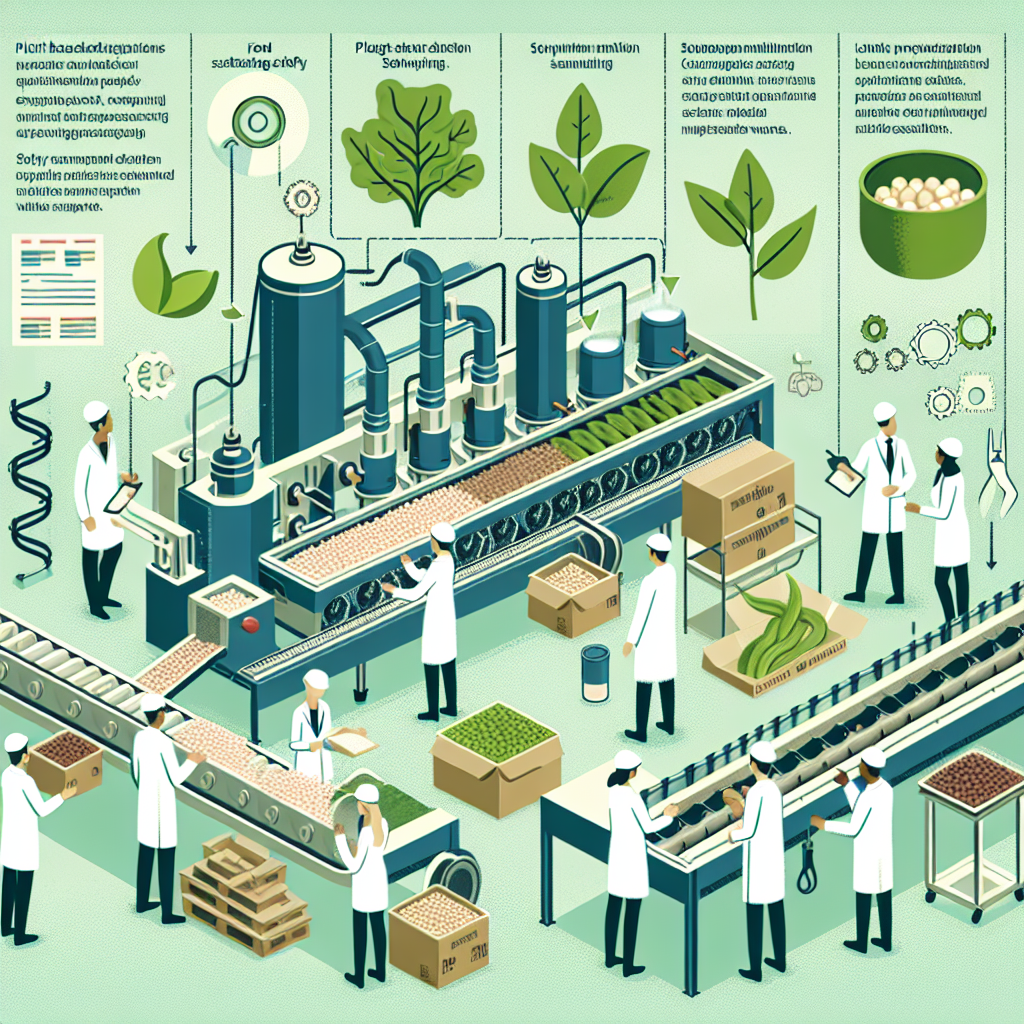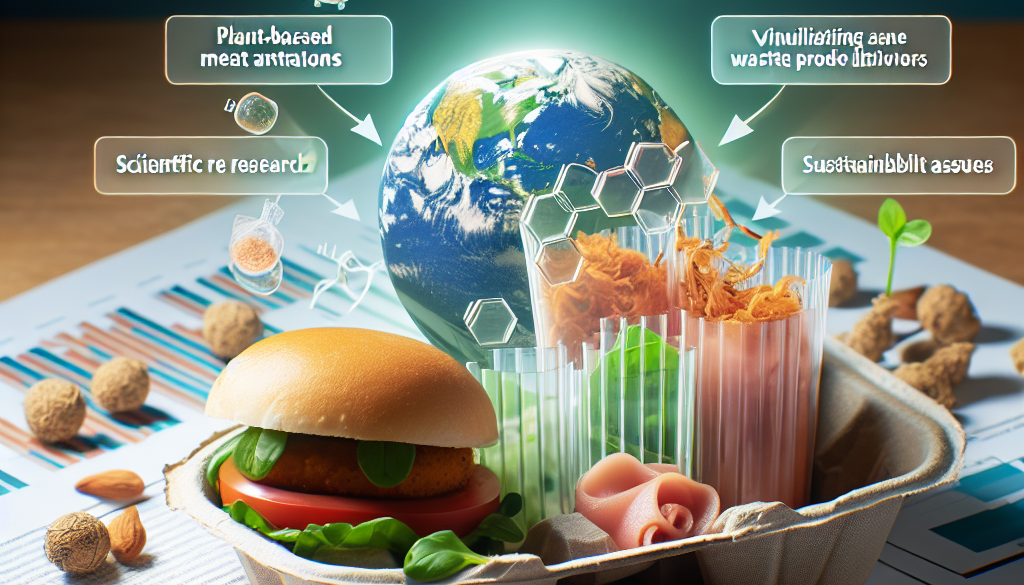Tackling Food Safety And Waste In Plant-Based Meat Alternatives A Rise In Plant-Based Innovation Is Bringing Challenges For Food-Safety
-
Table of Contents
- Plant-Based Meat Alternatives: Ensuring Food Safety and Reducing Waste
- The Food Safety Challenge in Plant-Based Innovation
- Combating Food Waste in Plant-Based Meat Production
- Statistics Highlighting the Need for Action
- Best Practices for Food Safety in Plant-Based Meats
- Technological Innovations to Reduce Waste
- Conclusion: The Path Forward for Plant-Based Meats
- Discover ETprotein’s High-Quality Plant Proteins
Plant-Based Meat Alternatives: Ensuring Food Safety and Reducing Waste

The rise of plant-based meat alternatives has been meteoric, driven by consumer demand for sustainable and ethical food choices. However, this surge in popularity brings with it unique challenges, particularly in the realms of food safety and waste management. As the industry grows, it is imperative to address these issues to ensure the long-term viability of plant-based proteins.
The Food Safety Challenge in Plant-Based Innovation
Food safety is a paramount concern in the production of plant-based meats. Unlike traditional animal products, plant-based alternatives often rely on a complex array of ingredients to replicate the taste, texture, and nutritional profile of meat. This complexity can introduce multiple points of potential contamination and spoilage.
- Pathogen Risk: Plant-based products can be susceptible to bacterial contamination, such as E. coli, Salmonella, and Listeria. These pathogens can arise from raw materials or during the manufacturing process.
- Allergen Control: Many plant-based meats contain common allergens like soy, nuts, and gluten. Cross-contamination is a risk that manufacturers must diligently manage.
- Shelf Life: Plant-based meats often have a shorter shelf life than their animal-based counterparts, increasing the risk of spoilage and waste.
Ensuring food safety requires rigorous testing, transparent supply chains, and strict adherence to food safety protocols. Manufacturers must invest in high-quality control systems and training to mitigate these risks.
Combating Food Waste in Plant-Based Meat Production
Food waste is a significant issue in the food industry, and plant-based meat alternatives are not exempt. The production process, distribution, and consumer handling all contribute to waste. Strategies to combat this include:
- Improved Packaging: Innovations in packaging can extend shelf life and protect against contamination.
- Supply Chain Efficiency: Streamlining the supply chain can reduce spoilage during transportation and storage.
- Consumer Education: Teaching consumers about proper storage and preparation can minimize waste at home.
By implementing these strategies, the industry can reduce its environmental footprint and make plant-based eating more sustainable.
Statistics Highlighting the Need for Action
Recent studies underscore the urgency of addressing food safety and waste in the plant-based sector:
- A report by the Plant Based Foods Association showed a 27% increase in plant-based food sales in 2020, indicating a growing market with expanding food safety needs.
- The United Nations Environment Programme estimates that 17% of global food production may be wasted, with fruits and vegetables having the highest wastage rates.
- Research by the Food and Agriculture Organization of the United Nations suggests that nearly one-third of all food produced for human consumption is lost or wasted, equating to about 1.3 billion tons per year.
These statistics highlight the critical need for plant-based meat manufacturers to prioritize food safety and waste reduction.
Best Practices for Food Safety in Plant-Based Meats
To ensure the safety of plant-based meats, manufacturers should adopt the following best practices:
- Ingredient Sourcing: Use high-quality, traceable ingredients from reputable suppliers.
- Sanitation Protocols: Implement strict cleaning and sanitation procedures to prevent cross-contamination.
- Regular Testing: Conduct frequent testing for pathogens, spoilage organisms, and allergens.
- Employee Training: Provide comprehensive training for employees on food safety standards and practices.
Adherence to these practices will help maintain consumer trust and ensure the safety of plant-based products.
Technological Innovations to Reduce Waste
Technology plays a crucial role in reducing waste in the plant-based meat industry. Innovations include:
- Advanced Preservation Techniques: Techniques like high-pressure processing can extend shelf life without the need for preservatives.
- Smart Packaging: Packaging with sensors can indicate when a product is nearing spoilage, allowing for better inventory management.
- Supply Chain Analytics: Data analytics can optimize production schedules and distribution routes to minimize waste.
Investing in these technologies can help the industry become more efficient and sustainable.
Conclusion: The Path Forward for Plant-Based Meats
The plant-based meat industry is at a critical juncture. As demand continues to rise, so does the responsibility to ensure food safety and minimize waste. By implementing best practices, embracing technological innovations, and educating consumers, manufacturers can overcome these challenges. The success of plant-based meats depends not only on their ability to replicate the taste and texture of animal products but also on their safety and sustainability credentials.
Discover ETprotein’s High-Quality Plant Proteins
For those seeking reliable sources of plant-based proteins, ETprotein offers a range of products that meet the highest standards of quality and safety. Their organic bulk vegan proteins and L-(+)-Ergothioneine are ideal for manufacturers looking to create safe and sustainable plant-based meat alternatives. With a commitment to non-GMO, allergen-free ingredients, and high purity levels, ETprotein is a trusted partner in the plant-based industry.
About ETprotein:
ETprotein, a reputable protein and L-(+)-Ergothioneine (EGT) Chinese factory manufacturer and supplier, is renowned for producing, stocking, exporting, and delivering the highest quality organic bulk vegan proteins and L-(+)-Ergothioneine. They include Organic rice protein, clear rice protein, pea protein, clear pea protein, watermelon seed protein, pumpkin seed protein, sunflower seed protein, mung bean protein, peanut protein, and L-(+)-Ergothioneine EGT Pharmaceutical grade, L-(+)-Ergothioneine EGT food grade, L-(+)-Ergothioneine EGT cosmetic grade, L-(+)-Ergothioneine EGT reference grade and L-(+)-Ergothioneine EGT standard. Their offerings, characterized by a neutral taste, non-GMO, allergen-free attributes, with L-(+)-Ergothioneine purity over 98%, 99%, cater to a diverse range of industries. They serve nutraceutical, pharmaceutical, cosmeceutical, veterinary, as well as food and beverage finished product distributors, traders, and manufacturers across Europe, USA, Canada, Australia, Thailand, Japan, Korea, Brazil, and Chile, among others.
ETprotein specialization includes exporting and delivering tailor-made protein powder and finished nutritional supplements. Their extensive product range covers sectors like Food and Beverage, Sports Nutrition, Weight Management, Dietary Supplements, Health and Wellness Products, and Infant Formula, ensuring comprehensive solutions to meet all your protein needs.
As a trusted company by leading global food and beverage brands and Fortune 500 companies, ETprotein reinforces China’s reputation in the global arena. For more information or to sample their products, please contact them and email sales(at)ETprotein.com today.












